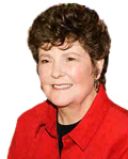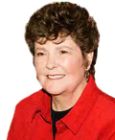Intelligence
50 Years of United States Presidential Scholars
Students honored for high achievement offer lessons to parents and teachers.
Posted July 3, 2014
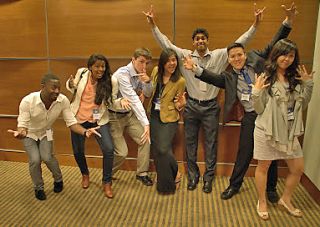
Young scholars celebrate the 50th anniversary of the U. S. Presidential Scholars program.
Recently I was privileged to attend the 50th anniversary celebration of the United States Presidential Scholars program, hosted by the Scholars' Alumni Association. The 250+ Scholars who participated shared one thing in common: each, as a high school senior, received a U. S. Presidential Scholars medal for outstanding scholarship, leadership, and community service. Since 1978, exceptional young performing artists, visual artists, and musicians have also been recognized as Presidential Scholars. A Presidential Scholar medal is the highest academic honor any American high school student can achieve. Over the last fifty years, more than 6,000 students have been named Presidential Scholars.
Presidential Scholars are "winners" in the broadest sense. Many go on to lives of high achievement, but not necessarily in expected ways. Some are ministers, homemakers, or military officers, while other win Pulitzer Prizes, excel as financiers and business leaders, become governors of states, star in movies, or serve as ambassadors to foreign countries. Released at the 50th anniversary event was a special publication that chronicles the life experiences and insights of many U. S. Presidential Scholars—the famous and not-so-famous alike.
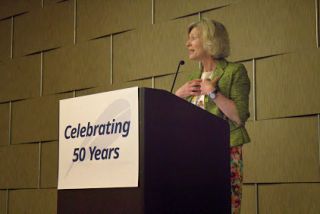
Neuroscientist Anya Hurlbert
During the celebration, the Scholars—who now range in age from 18 to 68—participated in seminars and panels addressing many contemporary problems and issues. The discussions were led by "some of their own." Anya Hurlbert, a 1976 Scholar from Texas, for example, is now an internationally renowned neuroscientist; she presented some of the latest research on the brain's visual processing system. Wall Street innovator Sallie Krawcheck, a 1983 Scholar from South Carolina, addressed the challenges of leadership in the 21st century—for young and not-so-young alike. There was a panel on the changing role of the media in our society, introduced by Pulitzer prize winning journalist Eugene Robinson (South Carolina, 1970), and a presentation on climate change by geoscientist Richard Alley (Ohio, 1976) of PBS fame. Through those discussions and several others like them, the Scholars rediscovered what unites them: in the words of educational researcher Felice Kaufmann, "curiosity, a love of learning, and a passion for ideas and knowledge."
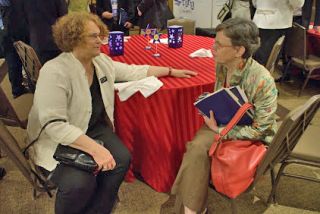
Felice Kaufmann (left) chats with 1966 Scholar and civil rights leader Martha Bergmark (right).
Kaufmann knows more about Presidential Scholars than they know about themselves. She's been studying 145 individuals from the 1964–1968 cohort of Presidential Scholars for more than 40 years. She set out to discover how gifted and talented teens fare as they move through adult life, and her longitudinal study stands as a unique contribution to the field of education in general, and gifted education in particular.
Her remarks at the 50th anniversary gathering uncovered some of the problems that intellectually gifted students can face, and her recommendations challenged some currently popular educational trends and practices. She offered two unusual, perhaps even controversial, definitions of success: "knowing what you need and meeting those needs" and "finding peace with your place in the world." Kaufmann suggested that parents and teachers should teach kids "how to fail well, not just to reach for the stars." A child who is valued only for achievement can grow to feel like an imposter, she explained. "Feeling like they need to always be 'on' and that if they slip up someone will find out that they are not really all that gifted. Fear that someday they will be 'caught' often makes them hide," she said, quoting a Scholar who responded to one of her surveys:
By middle school I started to hide my successes. I became extremely self-conscious whenever I made a mistake or needed to ask a question, as the rest of the class would go, “Oooooh,” in a sort of hushed shock. It took me many years to be able to ask questions freely. I assumed that not to know an answer was a terrible, humiliating failure. Even in my career I was so used to holding back that I had no understanding or experience with competition, including what to do when faced with it. Somehow I did okay, but I would have gotten a lot more out of life without that burden.
Kaufmann said that academic achievement can hide significant problems at home or at school. "We tend to forget, when we are so dazzled by [Scholars'] accomplishments, that there are potentially lots of internal struggles going on in other parts of their lives. Their achievements can mask what they are really going through," Kaufmann said. She described a participant in her study who was saddled with caring for her younger siblings at a very early age:
"You’re so smart," [my mother] used to say. "You can handle it." So I became a very mature child. People love a mature child. By comparison to home, school was so easy. All I had to do was do what was assigned, be cheerful. In high school I’d be one of the first people in the building in the morning and always the last to leave. I just couldn’t face going home. Shouldn’t somebody have noticed?"
Kaufmann advised against over-praising children and teens. "Kids can become hooked on praise," she said. "Kids need practice in making mistakes and in recovering/learning from mistakes." To the teachers in her audience, she recommended assigning students biographies that highlight the times when famous people failed and that describe how they came back from their setbacks. "Teach resilience!" she advised, and teach that success can and should have many different definitions, each personalized to an individual's own needs and wants. Fulfillment, which Kaufmann equates with success, can come in many packages. As one Scholar in her study put it:
I guess my feeling about achievement really hasn't changed. I still demand the equivalent of straight A's from myself, even though I know in real life that you won't get all A’s the way you did in school. My mother said I had such great potential and that it was a shame I never realized it. My rational side thinks she's wrong, but my emotional side suspects she's right. I've just kinda lived life as it came. My definition of success is dying knowing that you had one helluva fun ride. I can do that.
When Kaufmann speaks to parents and teachers, she advises them to help young people find personal meaning in their work, so students aren't achieving merely for the sake of achievement. She suggests that school assignments be related to students' personal interests and strengths. "Help them figure out what their real needs are," she says.
A number of the Scholars at the 50th anniversary gathering have done just that. As one Scholar put it:
Everyone hears all the advice early--work hard, be good to others, kindness counts, stay rooted in your community and do honest work--but no one really understands this until they get older. I certainly didn't. Just try to do what you really like and are good at... You have to live with who you are and what you have done. Success is feeling OK about the general trajectory of your life, despite the parts which were not done well or not done at all. . . . I used to have the feeling of needing to move forward on many fronts of life at once but now I know that no one is remembered for very long. Focus on helping the next generation. Don't kill or harm unnecessarily. Focus on what you enjoy, because that is what you will do well. Be as good as your word. And figure out what you really need out of life--whether there are awards and recognition there or not.
Background on U. S. Presidential Scholars
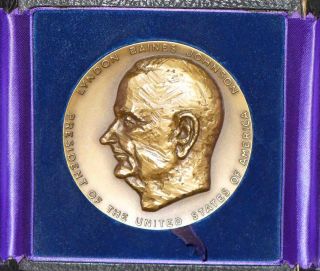
A U. S. Presidential Scholars medal from the first year, 1964.
The U.S. Presidential Scholars program was created in 1964 by executive order of President Lyndon Johnson, and it has been continued by every president since. Its objective is to promote excellence in education and achievement in America by recognizing high school seniors who have distinguished themselves in intellectual pursuits and leadership. Since 1978, performing artists, visual artists, and musicians have also been honored as Presidential Scholars. Since 1983, Scholars have recognized the teachers who have been the most influential in their lives.
Over the last fifty years, more than 6,000 men and women from 50 states, Puerto Rico, DC, and the American schools abroad have been named U.S. Presidential Scholars. They were selected through consideration of multiple criteria: learning potential, school record, extracurricular and community activities, innovation, creativity, and more. Scholar alumni include 59 Rhodes Scholars, 43 Marshall Scholars, a U.S. Poet Laureate, a governor, an ambassador, and a Miss America.
Resources
Psychology Today, "Life Lessons from Teenage "Brains" of the 1960s."
U.S. Presidential Scholars Alumni Association
50 Years of Presidential Scholars: In Pursuit of Excellence
Felice A. Kaufmann & Dona J. Matthews (2012): "On Becoming Themselves: The 1964–1968 Presidential Scholars 40 Years Later." Roeper Review, 34:2, 83-93
U. S. Presidential Scholars Program (U. S. Department of Education)
Credits
Photos courtesy of David Tabb (Missouri, 1992)
Banner design by Tina Lawrence (Ohio, 1989), Snow Design Group Inc.
